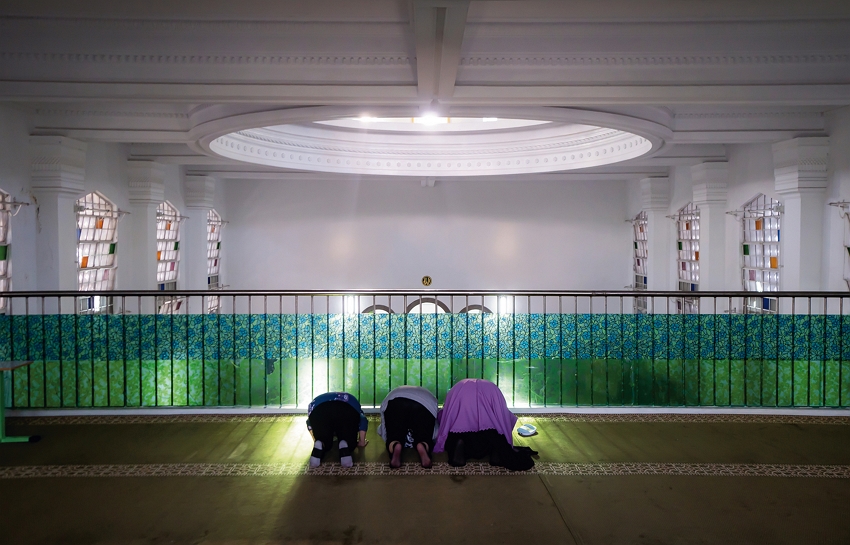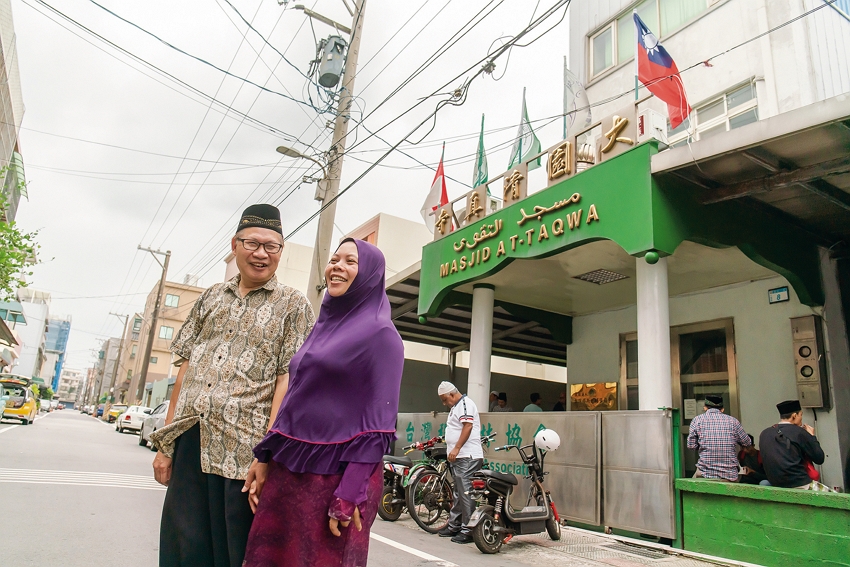
For Muslims, Islam’s close connection to everyday life takes it beyond simply religion, expanding it into an attitude and philosophy of life built around devotion. (photo by Lin Min-hsuan)
… truly pious is he who believes in God, and the Last Day; and the angels, and revelation, and the prophets; and spends his substance—however much he himself may cherish it—upon his near of kin, and the orphans, and the needy, and the wayfarer, and the beggars, and for the freeing of human beings from bondage; and is constant in prayer, and renders the purifying dues; and [truly pious are] they who keep their promises whenever they promise, and are patient in misfortune and hardship and in time of peril…
—Qur’an 2:177
It is nearly noon on a Friday, and the call to prayer is ringing out from the Taipei Grand Mosque on Xinsheng South Road. Muslims from countries such as Indonesia, Jordan and Syria gather in the main hall to kneel and pray in Arabic. The atmosphere is one of harmony and tranquility.
Were it not for the imam preaching in Mandarin, the foreign faces filling the hall would make it easy to forget that we’re in Taiwan.
Islamic spirit
The word “Islam” comes from Arabic, and means “submission” and “peace.” A “Muslim” is one who submits to Allah and follows the Islamic faith. The Qur’an instructs Muslims in proper behavior in everything from diet, marriage and charity to business. Yasin Huang, chairman of the Taiwan Muslim Association, says, “The Qur’an is the soul of Islam. Reading and understanding it enables you to grasp the whole of the world.” Whatever the question, the Qur’an has the answer.
Muslims are expected to pray five times a day, once each at dawn, midday, afternoon, sunset and night, with the timing of the prayers based on the local sunrise. When praying, Muslims kneel, place their hands on the ground, and bow their heads, bringing their foreheads and noses close to the ground to humbly make their confessions to Allah. For Muslims, Islam’s close connection to everyday life takes it beyond simply religion, expanding it into an attitude and philosophy of life built around devotion.
Muslims in Taiwan
When the time for prayers arrives, Muslims pray wherever they happen to be, but if they have the opportunity, they go to a mosque. You often see foreign Muslims who study nearby gathering at the Taipei Grand Mosque in the evenings, or migrant caregivers taking their elderly charges for a stroll around the mosque and while they themselves pray. Ismail Wang, executive secretary of the Taipei Grand Mosque, says that mosques are gathering places, especially on Fridays, when Muslims come together for Jumu’ah (the noon prayer on Friday). Congregants listen to a sermon, pray, and catch up with their compatriots. “A mosque is like a second home,” says Omar P.S. Wang, chairman of the Taipei Grand Mosque.
Built in 1958, the Taipei Grand Mosque’s first congregants were Muslims who came to Taiwan from mainland China with the Kuomintang government. Overseas Chinese from remote parts of Thailand and Myanmar later came to make up the core of Taiwan’s Muslim community with ROC citizenship. Over the last decade, the growing number of Southeast Asians in Taiwan for work, study or marriage has created an emerging Muslim presence on our island. As a result, most of the Taipei Grand Mosque’s worshipers are now foreign nationals. “There are people from Saudi Arabia, Jordan and Syria, but most are from African nations and Indonesia,” says Wang. The Taipei Grand Mosque is a case study in the changing demographics of Taiwan’s Muslim population.

Yasin Huang and Rachmatul Chasanah together built Taoyuan’s At-Taqwa Mosque in hopes of providing local Muslims with a place to unburden themselves of the stresses in their lives. (photo by Lin Min-hsuan)
Backed by biandang
The Qur’an says that Muslim women can only marry Muslim men, and that spouses must be of the same religion to have a harmonious household. As a result, many Taiwanese men have converted to Islam in order to marry Indonesian women. But they often do so only superficially and don’t truly abide by Islam’s teachings after their marriage, with some even becoming estranged from their wives because they have trouble accepting their wives’ regular prayers and inability to eat pork.
Yasin Huang recalls that he failed to follow Islamic teachings during the early part of his marriage to his Indonesian bride, Rachmatul Chasanah. His wife’s forbearance and constant reminders eventually brought him to an understanding of the real implications of being Muslim. During his previous marriage, he drank and gambled, and had a fiery temper. That changed when he married his Indonesian bride, who he had met through work. Huang says that after converting to Islam he began to understand the importance of integrity and responsibility, and that his parents felt like they’d gotten their son back. “I’ve been a Muslim since my childhood,” says Rachmatul. “Our marriage was arranged by Allah. Fate brought us together, so I had no fear.”
After they’d been married a few years, Rachmatul got the idea to open a shop selling biandang (boxed meals). The many factories of Taoyuan’s Dayuan District employ large numbers of Indonesian migrant workers, but Muslim-friendly fare was hard to find. Islam’s dietary restrictions originate in the Qur’an’s notions of purity, and include prohibitions on eating pork and rules regarding the consumption of other meats. For example, animals slaughtered for meat must be healthy and their meat must be processed by Muslims in accordance with Islamic teachings.
Rachmatul’s homestyle meals meet the needs of these migrant workers. The couple’s business grew over the next two or three years, but they worried about the wellbeing of the local workers. Far from a mosque, many were employed by factories that wouldn’t let them attend Jumu’ah on the grounds that doing so would interfere with their work. “Without prayer and confession, it’s easy to lose yourself and take up drinking and carousing,” says Huang. The couple therefore established a prayer hall on the second floor of their restaurant.
They also used their earnings from the restaurant to lease a nearby piece of land, on which they built the At-Taqwa Mosque to tend to the needs of local Muslims in gratitude for Allah’s care. Huang points out that Taiwan’s migrant workers and immigrants live in what is to them a foreign land. He hopes the mosque will provide them with a place to tell Allah of their trials and ease their burdens. “Some people weep while praying, but then are able to leave smiling.”
Warmed by faith
When local migrant workers and immigrants run into difficulties, they often turn to Rachmatul for help. Quite a few immigrant wives have come to the couple’s door with their children, asking to borrow money after being thrown out by their husbands. Knowing that lending it to them wouldn’t solve the underlying problem, the couple would help the women become self-reliant by instead providing the financial backing to open a shop selling Indonesian goods. Huang went on to establish the Taiwan Muslim Association in 2015 to provide immigrants needing assistance with grants to open their own shops. He humbly says that helping people without accepting interest is a Qur’anic doctrine.
“Our doctrine includes the principle of zakat, which is that 2.5% of one’s income above that required for one’s basic needs should be donated to the poor,” says Ismail Wang. The principle has made helping others almost instinctive for Muslims. When runaway migrant workers come looking for aid, Yasin Huang provides them with food and lodging, then accompanies them when they turn themselves in to the National Immigration Agency. He also helps them with the costs of a passport and plane ticket. Over the last few years, he’s aided nearly 3,000 migrant workers.
Muslims believe in humbly showing reverence for Allah, accepting their responsibilities, and helping others. Everything else, they leave in the hands of God. Islam’s message of peace and stability may be like the hot meal that the Huangs prepare for Muslims far from home after Jumu’ah. No matter how cold the weather or how distressing one’s circumstances, faith warms the heart.











